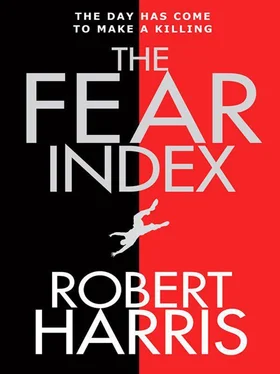Robert Harris - The Fear Index
Здесь есть возможность читать онлайн «Robert Harris - The Fear Index» весь текст электронной книги совершенно бесплатно (целиком полную версию без сокращений). В некоторых случаях можно слушать аудио, скачать через торрент в формате fb2 и присутствует краткое содержание. Жанр: Триллер, на английском языке. Описание произведения, (предисловие) а так же отзывы посетителей доступны на портале библиотеки ЛибКат.
- Название:The Fear Index
- Автор:
- Жанр:
- Год:неизвестен
- ISBN:нет данных
- Рейтинг книги:4 / 5. Голосов: 1
-
Избранное:Добавить в избранное
- Отзывы:
-
Ваша оценка:
- 80
- 1
- 2
- 3
- 4
- 5
The Fear Index: краткое содержание, описание и аннотация
Предлагаем к чтению аннотацию, описание, краткое содержание или предисловие (зависит от того, что написал сам автор книги «The Fear Index»). Если вы не нашли необходимую информацию о книге — напишите в комментариях, мы постараемся отыскать её.
The Fear Index — читать онлайн бесплатно полную книгу (весь текст) целиком
Ниже представлен текст книги, разбитый по страницам. Система сохранения места последней прочитанной страницы, позволяет с удобством читать онлайн бесплатно книгу «The Fear Index», без необходимости каждый раз заново искать на чём Вы остановились. Поставьте закладку, и сможете в любой момент перейти на страницу, на которой закончили чтение.
Интервал:
Закладка:
‘Right then, we can at last get started. So – welcome, friends, to Geneva. It’s almost eight years since Alex and I set up shop together, using his intelligence and my looks, to create a very special kind of investment fund, based exclusively on algorithmic trading. We started with just over a hundred million dollars in assets under management, a big chunk of it courtesy of my old friend over there, Bill Easterbrook, of AmCor – welcome, Bill. We made a profit that first year, and we’ve gone on making a profit every year, which is why we are now one hundred times larger than when we started, with AUM of ten billion dollars.
‘I’m not going to boast about our track record. I hope I don’t need to. You all get the quarterly statements and you know what we’ve achieved together. I’ll just give you one statistic. On the ninth of October 2007, the Dow Jones Industrial Average closed at 14,164. Last night – I checked it before I left my office – the Dow closed at 10,866. That represents a loss over more than two and a half years of almost one quarter. Imagine that! All those poor saps with their retirement plans and their tracker bonds have lost about twenty-five per cent of their investment. But you, by placing your trust in us over the same period, have seen your net asset value increase by eighty-three per cent. Ladies and gentlemen, I think you’ll agree that bringing your money to us was a pretty smart thing to have done.’
For the first time Hoffmann risked a brief glance around the table. Quarry’s audience was listening intently. (‘The two most interesting things in the world,’ Quarry once remarked: ‘other people’s sex lives and your own money.’) Even Ezra Klein, rocking back and forth like a student in a madrasa, was temporarily still, while Mieczyslaw Lukasinski simply could not keep the grin off his plump peasant face.
Quarry’s right hand continued to rest on Hoffmann’s shoulder; his left was thrust casually in his pocket. ‘In our business we call the gap between market performance and fund performance “alpha”. Over the past three years, Hoffmann has generated alpha of one hundred and twelve per cent. That’s why we’ve twice been voted Algorithmic Hedge Fund of the Year by the financial trade press.
‘Now,’ he went on, ‘this consistency of performance is not, I can assure you, a matter of luck. Hoffmann spends thirty-two million dollars a year on research. We employ sixty of the most brilliant scientific minds in the world – at least I’m told they’re brilliant: I can’t understand a word they’re on about.’
He acknowledged the rueful laughter. Hoffmann saw that the British banker, Iain Mould, was chuckling particularly hard, and he knew at once that he was a fool. Quarry withdrew his hands from Hoffmann’s shoulder and from his own pocket and placed them on the table. He leaned forward, suddenly serious and urgent.
‘About eighteen months ago, Alex and his team achieved a significant technological breakthrough. As a result we had to take the very difficult decision to hard-close the fund.’ Hard-close meant turning away additional investment even from existing clients. ‘And I know that every single one of you in this room – because that is why we’ve invited you here – was disappointed by that decision, and also bewildered, and that some of you were actually pretty angry about it.’
He glanced at Elmira Gulzhan listening at the opposite end of the table. She had screamed at Quarry down the phone, Hoffmann knew, and had even threatened to withdraw the family’s money from the fund or worse (‘You hard-close the Gulzhans – the Gulzhans hard-close you…).
‘Well,’ continued Quarry, with the merest hint of a kiss blown in Elmira’s direction, ‘we apologise for that. But we took the view that we had to concentrate on implementing this new investment strategy based on our existing asset size. There’s always a risk with any kind of fund, as I’m sure you’re aware, that increasing size translates into decreasing performance. We wanted to be as confident as we could be that that wouldn’t happen.
‘It is now our opinion that this new system, which we call VIXAL-4, is robust enough to cope with portfolio expansion. Indeed, the alpha generated over the last six months has been significantly greater than it was when we were relying on our original algorithms. Therefore, as of today, I can announce that Hoffmann is moving from a hard-closed to a soft-closed position, and is willing to accept additional investment from existing clients only.’
He stopped and took a sip of water to allow the impact of his words to sink in. There was complete silence in the room.
‘Cheer up, everyone,’ he said brightly, ‘this is supposed to be good news.’
The tension was released by laughter and for the first time since Hoffmann entered the room the clients looked openly at one another. They had become a private club, he realised: a freemasonry bound together by a shared secret knowledge. Complicit smiles spread around the table. They were on the inside track.
‘At which point,’ said Quarry, looking on contentedly, ‘I think the best thing I can do is hand you over to Alex here, who can fill you in a bit more on the technical side.’ He half-sat down then stood again. ‘With a bit of luck I may even be able to understand it myself.’
More laughter, and then the floor was Hoffmann’s.
He was not a man to whom speaking in public came naturally. The few classes he had taught at Princeton before leaving the United States had been torture for lecturer and students alike. But now he felt himself filled with a strange energy and clarity. He touched his fingers lightly to his sewn-up wound, took a couple of deep breaths, then rose to his feet.
‘Ladies and gentlemen, we have to be secretive about the detail of what we do in this company, to avoid having our ideas stolen by our competitors, but the general principle is no great mystery, as you well know. We take a couple of hundred different securities and we trade them over a twenty-four-hour cycle. The algorithms we have programmed into our computers pick the positions we hold based on a detailed analysis of previous trends, mostly liquid futures – the Dow, say, or the S and P 500 – and the familiar commodities: Brent crude, natural gas, gold, silver, copper, wheat, whatever. We also do some high-frequency trading, where we may hold positions for only a few milliseconds. It’s really not that complicated. Even the S and P two-hundred-day moving average can be a pretty reliable predictor of the market: if the current index is higher than the preceding average, the market is likely to be bullish; if lower, bearish. Or we can make a prediction, based on twenty years of data, that if tin is at this price and the yen at that, then it is more likely than not that the DAX will be here. Obviously we have vastly more pairs of averages than that to work with – several millions of them – but the principle can be simply stated: the most reliable guide to the future is the past. And we only have to be right about the markets fifty-five per cent of the time to make a profit.
‘When we started out, not many people could have guessed how important algorithmic trading would turn out to be. The pioneers in this business were frequently dismissed as quants, or geeks, or nerds – we were the guys who none of the girls would dance with at parties-’
‘That’s still true,’ interjected Quarry.
Hoffmann waved aside the interruption. ‘Maybe it is, but the successes we have achieved at this firm speak for themselves. Hugo pointed out that in a period when the Dow has declined by nearly twenty-five per cent, we’ve grown in value by eighty-three per cent. How has this happened? It’s very simple. There have been two years of panic in the markets, and our algorithms thrive on panic, because human beings always behave in such predictable ways when they’re frightened.’
Читать дальшеИнтервал:
Закладка:
Похожие книги на «The Fear Index»
Представляем Вашему вниманию похожие книги на «The Fear Index» списком для выбора. Мы отобрали схожую по названию и смыслу литературу в надежде предоставить читателям больше вариантов отыскать новые, интересные, ещё непрочитанные произведения.
Обсуждение, отзывы о книге «The Fear Index» и просто собственные мнения читателей. Оставьте ваши комментарии, напишите, что Вы думаете о произведении, его смысле или главных героях. Укажите что конкретно понравилось, а что нет, и почему Вы так считаете.










